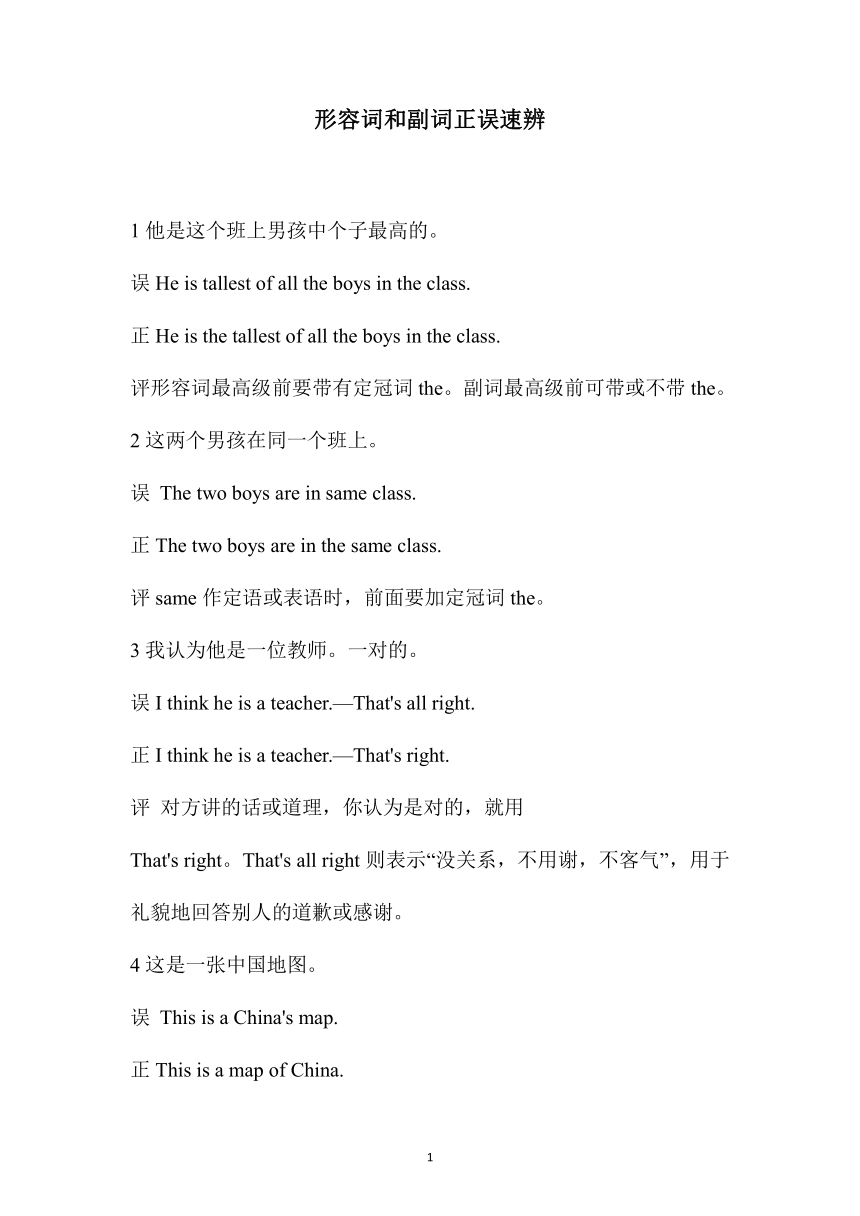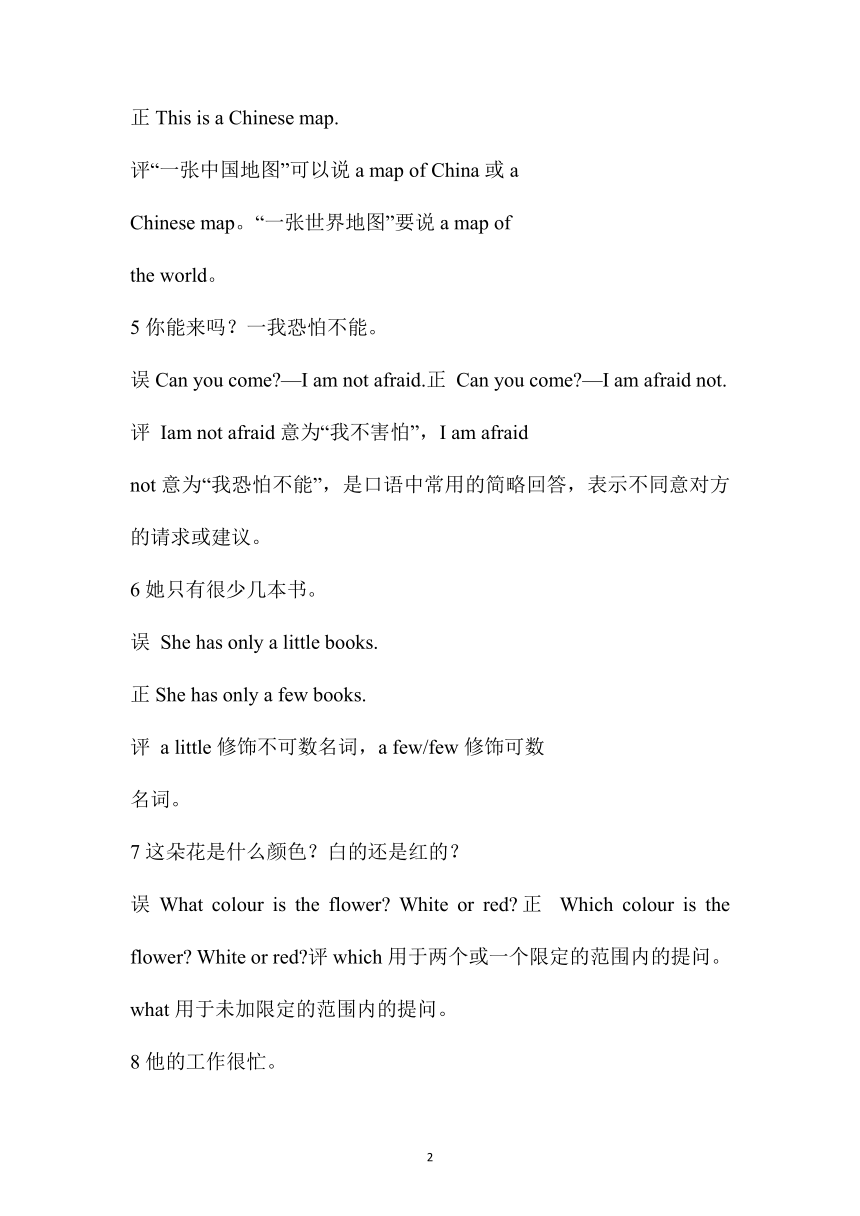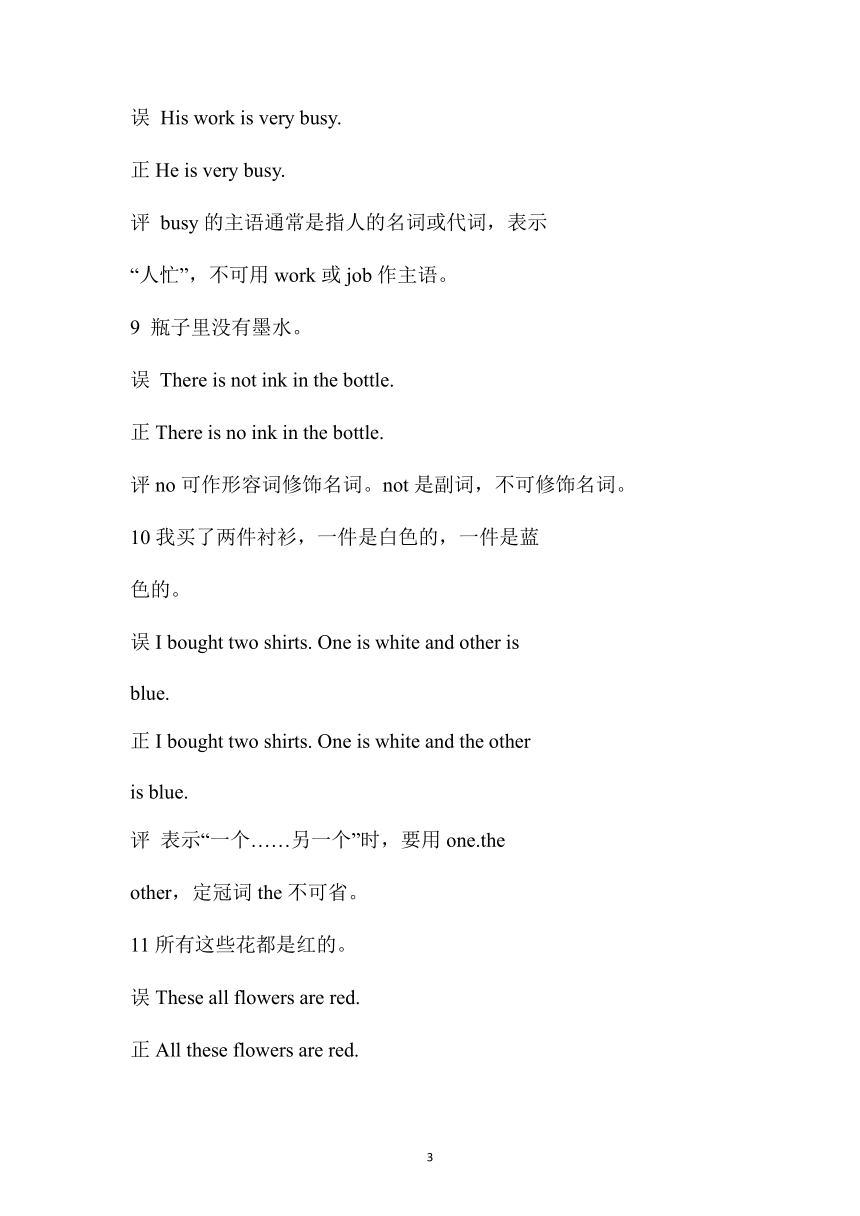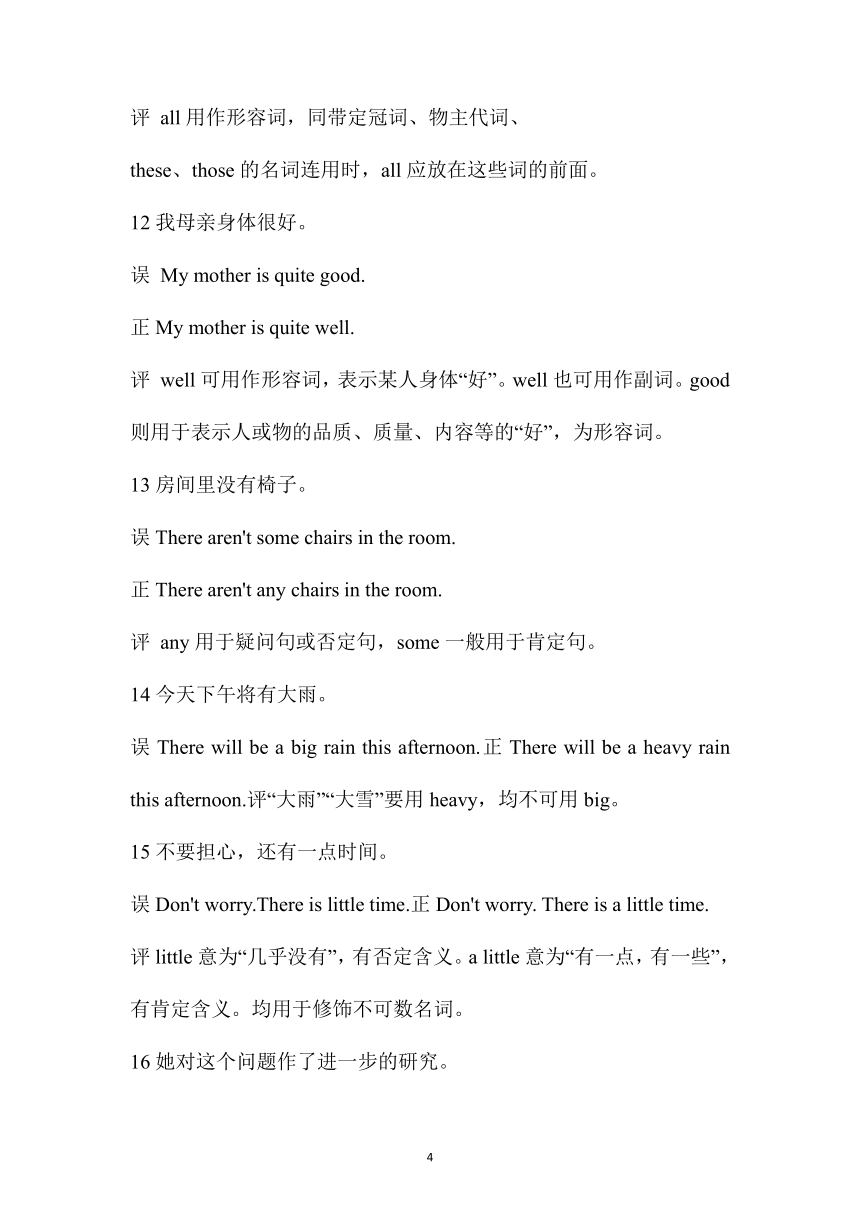2022年中考英语辨析系列--- (7)形容词和副词正误速辨
文档属性
| 名称 | 2022年中考英语辨析系列--- (7)形容词和副词正误速辨 |  | |
| 格式 | docx | ||
| 文件大小 | 28.0KB | ||
| 资源类型 | 教案 | ||
| 版本资源 | 通用版 | ||
| 科目 | 英语 | ||
| 更新时间 | 2022-02-28 21:48:58 | ||
图片预览





文档简介
形容词和副词正误速辨
1他是这个班上男孩中个子最高的。
误He is tallest of all the boys in the class.
正He is the tallest of all the boys in the class.
评形容词最高级前要带有定冠词the。副词最高级前可带或不带the。
2这两个男孩在同一个班上。
误 The two boys are in same class.
正The two boys are in the same class.
评same作定语或表语时,前面要加定冠词the。
3我认为他是一位教师。一对的。
误I think he is a teacher.—That's all right.
正I think he is a teacher.—That's right.
评 对方讲的话或道理,你认为是对的,就用
That's right。That's all right则表示“没关系,不用谢,不客气”,用于礼貌地回答别人的道歉或感谢。
4这是一张中国地图。
误 This is a China's map.
正This is a map of China.
正This is a Chinese map.
评“一张中国地图”可以说a map of China或a
Chinese map。“一张世界地图”要说a map of
the world。
5你能来吗?一我恐怕不能。
误Can you come —I am not afraid.正 Can you come —I am afraid not.
评 Iam not afraid意为“我不害怕”,I am afraid
not意为“我恐怕不能”,是口语中常用的简略回答,表示不同意对方的请求或建议。
6她只有很少几本书。
误 She has only a little books.
正She has only a few books.
评 a little修饰不可数名词,a few/few修饰可数
名词。
7这朵花是什么颜色?白的还是红的?
误What colour is the flower White or red 正 Which colour is the flower White or red 评which用于两个或一个限定的范围内的提问。
what用于未加限定的范围内的提问。
8他的工作很忙。
误 His work is very busy.
正He is very busy.
评 busy的主语通常是指人的名词或代词,表示
“人忙”,不可用work或job作主语。
9 瓶子里没有墨水。
误 There is not ink in the bottle.
正There is no ink in the bottle.
评no可作形容词修饰名词。not是副词,不可修饰名词。
10我买了两件衬衫,一件是白色的,一件是蓝
色的。
误I bought two shirts. One is white and other is
blue.
正I bought two shirts. One is white and the other
is blue.
评 表示“一个……另一个”时,要用one.the
other,定冠词the不可省。
11所有这些花都是红的。
误These all flowers are red.
正All these flowers are red.
评 all用作形容词,同带定冠词、物主代词、
these、those的名词连用时,all应放在这些词的前面。
12我母亲身体很好。
误 My mother is quite good.
正My mother is quite well.
评 well可用作形容词,表示某人身体“好”。well也可用作副词。good则用于表示人或物的品质、质量、内容等的“好”,为形容词。
13房间里没有椅子。
误There aren't some chairs in the room.
正There aren't any chairs in the room.
评 any用于疑问句或否定句,some一般用于肯定句。
14今天下午将有大雨。
误There will be a big rain this afternoon.正There will be a heavy rain this afternoon.评“大雨”“大雪”要用heavy,均不可用big。
15不要担心,还有一点时间。
误Don't worry.There is little time.正Don't worry. There is a little time.
评little意为“几乎没有”,有否定含义。a little意为“有一点,有一些”,有肯定含义。均用于修饰不可数名词。
16她对这个问题作了进一步的研究。
误 She made a farther study of the problem.正She made a further study of the problem.评 表示空间或时间上的“更远的/地”,两者常可换用,但farther比further更普通些。表示程度上的“进一步,更多的”,只能用further。
17他每三天打扫一次房屋。
误 He cleans the house each three days.正He cleans the house every three days.
评表示“每隔·…··”要用every,不可用each。
18再喝点咖啡好吗?
误Would you like any more coffee 正Would you like some more coffee
评表示客气地请求或希望对方给予肯定答复的疑问句中,要用some,不用any。
19 这道菜很好吃。
误The dish is very delicious to eat.正The dish is very delicious.
评 delicious已含有“好吃的,美味的”的意思。再加eat在语义上就重复了。
20全城的市民都出来欢迎英雄们。
误Whole town went out to welcome the heroes.正 The whole town went out to welcome the
heroes.
评whole修饰单数名词时,前面要加the,this,
that或形容词性物主代词。
21 我明天忙。
误I busy tomorrow.
正I'm busy tomorrow.
评busy,free,ready,afraid等是形容词,不可单独作谓语,要加be动词。
22 这儿很静。
误 It is very guite here.
正It is very quiet here.
评 quite是副词,意为“很,非常”。quiet意为
“寂静的,安静的”。
23他现在很少去看电影。
误He scarcely goes to the cinema now.正He rarely goes to the cinema now.
评rarely表示“很少,不常”,相当于seldom。scarcely表示“几乎不,简直不”。
24上海是中国第二大城市。
误 Shanghai is the second larger city in China.正Shanghai is the second largest city in China.评“第二大城市”意为“第二个最大的城市”,因
而要用最高级largest。
25你再喝点酒好吗?
误Would you like more some wine 正Would you like some more wine
评some和any同more连用时,总是要说some
more, any more。
26 请再给我一点水。
误Please get me a little water again.正 Please get me a little more water.
评这里的“再给”,不是表示“重新一次”,而是表示添加点水,故用more,不用again。
27这本书有人数最多的读者。
误This book has the most number of readers.正This book has the largest/biggest number of
readers.
评修饰number要用large, big或small,不用
most。
28你要多大码的鞋?
误How large size shoes do you want 正What size shoes do you want
评英语中问“多大尺码”要用what size提问。
29她两小时前离开家的。
误She left home two hours before.误She left home before two hours.正She left home two hours ago.
评从现在说话时往前推算,用ago,而从过去某时再往前推算,或表示过去某个时间点之前用
before。
30你的书包同她的书包是一样的。
误Your schoolbag is the same with hers.正 Your schoolbag is the same as hers.
评表示“同·……一样”,the same as为正确搭配,不可用with。
31他很晚才睡觉。
误He went to bad very lately.
正He went to bad very late.
评 late可作形容词或副词,反义词为early。
lately是副词,表示“近来,最近”,相当于
recently。
32吉姆跑得比我快得多。
误 Jim runs very faster than I/me.
正Jim runs much faster than I.
评very用于修饰形容词或副词原级,much修饰形容词或副词比较级。
33 这本书是你的还是李明的?一是我的。
误 Is this book yours or Li Ming's —Yes, it's mine.正Is this book yours or Li Ming's —It's mine.
评 回答选择问句不用Yes或No,直接说出被选项即可。
34 她五点半钟回家的。
误She went to home at half past five.
正 She went home at half past five.
评 “回家”常用go home表示,这里的home为副
词,故不可加to。
35她每两周回家1次。
误 She went home every two week.
误She went home every third weeks.正She went home every other week.正She went home every two weeks.
正She went home every second week.
评“每两周”就是“每隔一周”,表示“每隔一”用every other+单数名词;表示“每隔二或二以上”用“every+基数词+复数名词”或“every+序数词+单数名词”。
36这只苹果又大又甜。
误The apple is big, sweet.
正The apple is big and sweet.
评两个形容词作表语时,中间应有连词连接。两个以上的形容词并列作主语时,在最后一个形容词前加连词。
37你的鞋子在这里。穿上吧。
误Here are your shoes. Put on them, please.正Here are your shoes. Put them on, please.
评 由“及物动词+副词”构成的短语动词,其宾语为人称代词时,要放在介词前面,但如果宾语是名词,则放在介词前后均可。
38这架飞机能运载300名乘客。
误The plane is able to carry three hundred passengers.
正The plane can carry three hundred passengers.评able通常只用于表示人的能力,不能用于表示物的能力。
39明天请把你的词典带到这里来。
误Please bring your dictionary to here tomorrow.正Please bring your dictionary here tomorrow.评 here,there是副词,前面不可加介词to。
40 她不到20岁。
正She is less than twenty.
正She is below twenty.
正She is under twenty.
评 表示“不到·……岁”,可用below或under或less than。表示“超过……岁”,可用over或more than。
41她非常喜欢英语。
误She very likes English.
正She likes English very much.
评very意为“很,非常”,虽为副词,但不直接修饰动词,只能修饰形容词或副词。very much表示“很,非常”,用于修饰动词。
42很可能要下雨。
误 It'll rain likely.
正It'll very likely rain.
正Very likely it will rain.
评likely表示“很可能”,作副词时,不能单独使用,要用very,quite,more,most修饰。
43他星期天通常在家。
误He usually is at home on Sunday.正He is usually at home on Sunday.
评usually, often等频度副词一般放在be动词、助动词或状态动词后,行为动词前。
44这本书比那本书厚多了。
误This book is more thicker than that one.正This book is much thicker than that one.评 “more+多音节或部分双音节形容词原级”构
成比较级,形容词或副词比较级,不可用more修饰,但可用much,even,alot等修饰。
45 这个国家的人口有多少?
误 How many is the population of the country 正How large is the population of the country 正What's the population of the country
评population是集体名词,含抽象意义,要用large,big或small修饰,不可用many,less修饰。
46你多久打扫一次房间?
误How long do you clean your room 正 How often do you clean your room
评how often指“多长时间一次”,用来提问在某一特定时间内做某事的次数,回答通常是onceaweek (一周一次),three times a month (每月三次),never等。how long用于问“时间多长”,回答通常是two hours,awhole month等。
47 我没有时间。
误 I have no any time.
正 I have not any time.
评 no是形容词,常修饰名词,相当于not any,
不可说no any。
48她唱得很好。
误She sings very good.
正She sings very well.
评 good是形容词,修饰名词。well是副词,常修饰动词。
49他两个月后就离开了那所学校。
误He left the school two months late.
误He left the school two months later on.正He left the school two months later.
评 late意为“迟到,晚的”,常作表语或前置定语,不可作后置定语。later on意为“后来,今后”,为副词短语。“一段时间+later”意为“一段时间后”,为习惯用法。
50这花闻起来很香。
误 The flower smells sweetly.
正 The flower smells sweet.
评 在系动词后要用形容词,如:smell(闻起
来),feel(感觉),taste (尝起来),look (看
起来)等。
51 你不在一班吗?一不,我在一班。误 Aren't you in Class One —No.I am.正Aren't you in Class One —Yes. I am.
评 回答否定疑问句,表示肯定就用“Yes+肯定结构”,表示否定就用“No+否定结构”。
52 房间里至多有5把椅子。
误There are no more than five chairs in the room.正 There are not more than five chairs in the room.评 “not more than+数词”表示“至多,不超过”,相当于at (the) most。“no more than+数词”表示“仅仅”,相当于only。
53晚饭多久才能准备好?
误 How long will supper be ready
正How soon will supper be ready
评 how soon意为“多久以后”,对“过多长时间
就……”提问。how long意为“多久,多长时
间”,对一段时间进行提问。
54 他匆匆吃了早饭,上学去了。
误 He quick finished breakfast and went to school.正 He guickly finished breakfast and went to
school.
评 quick和quickly均可用作副词。quick常用在口语中,同come,run等表示行为的动词连用,一般要放在动词后。quickly既可放在动词前,也可放在动词后。
55 我将替你做那件事。
误I'll instead you to do it.
正I'll do it instead of you.
评 instead表示“代替”,为副词,不可作谓语。
“代替某人”要用instead ofsb.。
56 他一点也不在乎。
误He doesn't mind at (the) least.
正He doesn't mind in the least.
评 in the least意为“一点,丝毫”,常用于否定句中。at(the) least意为“至少,起码”。
57 这是相当高的一棵树。
误It is guite tall a tree.
正It is guite a tall tree.
正It is a quite tall tree.
评quite修饰单数名词时,如果名词前另有形容
词,有两种词序:quite+a/an+形容词+名词,
a quite+形容词+名词。
58有一天我在图书馆里碰到了她。误 I met her in the library some day.正I met her in the library one day.
评some day或someday用于将来时中,不用于过去时。one day既可用于将来时中,也可用于过去时中。
59天变得越来越冷了。
误The days are getting more and more cold.正The days are getting colder and colder.
评“more and more+多音节形容词或副词”表示
“越来越······”。如果是单音节形容词或副词,则用“比较级+and+比较级”。
60她转过身来,向窗外望去。
误She turned back and looked out of the window.
正 She turned around and looked out of the
window.
评“转过身来”要说turn around/round。 turn
back则表示“转回来,往回走”。
61 这条河同那条河一样宽。
误This river is so wide as that one.正This river is as wide as that one.
评在肯定句中,表示两者“同··……一样”,只用
as...as。而在否定句中,要用not so... as或not
as...as。
62 他们是非常相像的兄弟。
误They are brothers very alike.
正They are brothers very much alike.
评以a字母开首的表语形容词,如alike, afraid等,要用much或very much修饰,不用very修饰。
63晚饭后她就上楼去了。
误She went to upstairs after supper.
正She went upstairs after supper.
评upstairs (楼上)和downstaits (楼下) 常用
作副词,直接修饰动词作状语。64我上个月去过上海。
误I last month went to Shanghai.
正I went to Shanghai last month.
评通常情况下,表示确切时间的副词或副词短语要放在句尾。
65The car is running nice and fast.的含义误这辆小车跑得好,跑得快。
正 这辆小车跑得很快。
评“nice and+形容词/副词”表示“很……”,相当于very+形容词/副词。
66他比别人跑得快。
误 He runs faster than anybody.
正He runs faster than anybody else.
评一人或一物与其同类或同范围的人或物进行比较时,要加else。
67我从没见过这么高的山。
误 I've never seen a such high mountain.
误 I've never seen so a high mountain.
正I've never seen such a high mountain.
正I've never seen so high a mountain.
68这是不可能的,是吗?
误It is impossible, is it
正It is impossible, isn't it
正It is not possible, is it
评 在反意疑问句中,陈述句的谓语部分如果有im-,un-ir-,dis-等否定前缀构成的词,该陈述句仍看作是肯定,其后的附加问句用否定式。
69他学习像他哥哥一样努力。
误He studies as hardly as his brother.正He studies as hard as his brother.
评 hard作副词意为“努力地”;hardly则表示
“几乎不”,本身有否定含义。
70骑自行车比开车容易。
误It is easier to ride a bike than driving a car.正It is easier to ride a bike than to drive a car.评两个相比较的部分在结构上应相同,对称。
71会议就要开始了。
误 The meeting is about to begin at once.正The meeting is about to begin.
评be about to本身含有“将要”的意思,不可同
at once,soon,next week等时间状语连用。
72他对篮球很感兴趣。
误He is very interesting in basketball.正He is very interested in basketball.
73他几天后返回家了。
误 He returned back home a few days later.正He returned home a few days later.
评return意为“返回”,相当于come back,因而
return不可同back连用。
74他们是2009年5月10日下午3点出发的。
误They set out on the afternoon at three o'clock
May 10th 2009.
正They set out at three o'clock on the afternoon of
May 10th 2009.
评按英语习惯,总是把确切时间放在比较确切时
间之前,比较确切时间放在较笼统时间之前,
并且是由小到大。
75他们曾经在同一所学校读书。
误They ever studied in the same school.正They once studied in the same school.
评表示“曾经”,在肯定句中用once,在疑问句、否定句和条件句中用ever。
76你们班谁跳得最高?
误Who jumps tallest in your class 正 Who jumps highest in your class
评 high可作形容词或副词,而tall仅作形容词。
77他很少去看电影。
误He goes to the cinema seldom.
正He seldom goes to the cinema.
评英语中的频度副词总是放在主要谓语动词之前。
78她从来没有去过北京。
误She never has been to Beijing.
正She has never been to Beijing.
评频度副词总要放在助动词、情态动词或be动
词之后。
79你为什么做那件事?
误 Why did you do that for
正Why did you do that
正What did you do that for
评 why和what for都可用于特殊问句,表示“为什么····· ”why强调原因,常用because回答。what for强调目的,常用不定式回答,给出目的。
80过去几乎没有人见过这种花。
误Nearly no one saw this kind of flower in the
past.
正Almost no one saw this kind of flower in the
past.
评no one, nobody,nothing等否定性词要用
almost修饰,不用nearly修饰。
81他们今天下午将去公园里举行一次聚会。
误They will have a party this afternoon in the
park.
正 They will have a party in the park this
afternoon.
评同一个句子中既有时间副词,又有地点副词
时,应是地点副词在前,时间副词在后。
82你还有什么别的事情要告诉我吗?误 Do you have else anything to tell me 正Do you have anything else to tell me
评 else意为“别的,其他的”,常用于修饰
something,nothing,anything, nobody等不定代词,或修饰疑问代词、疑问副词,放在被修饰词之后。
83只有李明知道答案。
误 Li Ming only knows the answer.
正Only Li Ming knows the answer.
评 only,even等词,在句中位置灵活,不同的位置往往有不同的含义,通常应紧放在所修饰的词之前。
84我没去那里,杰克也没去那里。
误 I didn't go there. Jack either.
正 I didn't go there. Jack didn't either.
评 either表示“也”,通常用于否定句,放在句尾,本身没有否定意义。
85你越经常练习,你的英语就讲得越流利。
误The oftener you practise, the more you can speak English fluently.
正The oftener you practise,the more fluently you can speak English.
评“the+比较级……,the+比较级”意为“越来……越……”,两个比较级结构不可拆开。
86河太宽了,他游不过去。
误 The river was too wide that he couldn't swim across it.
正The river was so wide that he couldn't swim across it.
评so...that结构,表示“如此……以致”,so不可换成too,very,much等词。that引导结果状语从句。
87那个村庄离我们城市有200英里。
误 The village is 200 miles far from our city.正The village is 200 miles (away) from our city.评far from意为“离······远,远离”。表示“离
·····…有多远”常用“数 词+miles/kilometres
+away from”,away可省。
(
1
)
1他是这个班上男孩中个子最高的。
误He is tallest of all the boys in the class.
正He is the tallest of all the boys in the class.
评形容词最高级前要带有定冠词the。副词最高级前可带或不带the。
2这两个男孩在同一个班上。
误 The two boys are in same class.
正The two boys are in the same class.
评same作定语或表语时,前面要加定冠词the。
3我认为他是一位教师。一对的。
误I think he is a teacher.—That's all right.
正I think he is a teacher.—That's right.
评 对方讲的话或道理,你认为是对的,就用
That's right。That's all right则表示“没关系,不用谢,不客气”,用于礼貌地回答别人的道歉或感谢。
4这是一张中国地图。
误 This is a China's map.
正This is a map of China.
正This is a Chinese map.
评“一张中国地图”可以说a map of China或a
Chinese map。“一张世界地图”要说a map of
the world。
5你能来吗?一我恐怕不能。
误Can you come —I am not afraid.正 Can you come —I am afraid not.
评 Iam not afraid意为“我不害怕”,I am afraid
not意为“我恐怕不能”,是口语中常用的简略回答,表示不同意对方的请求或建议。
6她只有很少几本书。
误 She has only a little books.
正She has only a few books.
评 a little修饰不可数名词,a few/few修饰可数
名词。
7这朵花是什么颜色?白的还是红的?
误What colour is the flower White or red 正 Which colour is the flower White or red 评which用于两个或一个限定的范围内的提问。
what用于未加限定的范围内的提问。
8他的工作很忙。
误 His work is very busy.
正He is very busy.
评 busy的主语通常是指人的名词或代词,表示
“人忙”,不可用work或job作主语。
9 瓶子里没有墨水。
误 There is not ink in the bottle.
正There is no ink in the bottle.
评no可作形容词修饰名词。not是副词,不可修饰名词。
10我买了两件衬衫,一件是白色的,一件是蓝
色的。
误I bought two shirts. One is white and other is
blue.
正I bought two shirts. One is white and the other
is blue.
评 表示“一个……另一个”时,要用one.the
other,定冠词the不可省。
11所有这些花都是红的。
误These all flowers are red.
正All these flowers are red.
评 all用作形容词,同带定冠词、物主代词、
these、those的名词连用时,all应放在这些词的前面。
12我母亲身体很好。
误 My mother is quite good.
正My mother is quite well.
评 well可用作形容词,表示某人身体“好”。well也可用作副词。good则用于表示人或物的品质、质量、内容等的“好”,为形容词。
13房间里没有椅子。
误There aren't some chairs in the room.
正There aren't any chairs in the room.
评 any用于疑问句或否定句,some一般用于肯定句。
14今天下午将有大雨。
误There will be a big rain this afternoon.正There will be a heavy rain this afternoon.评“大雨”“大雪”要用heavy,均不可用big。
15不要担心,还有一点时间。
误Don't worry.There is little time.正Don't worry. There is a little time.
评little意为“几乎没有”,有否定含义。a little意为“有一点,有一些”,有肯定含义。均用于修饰不可数名词。
16她对这个问题作了进一步的研究。
误 She made a farther study of the problem.正She made a further study of the problem.评 表示空间或时间上的“更远的/地”,两者常可换用,但farther比further更普通些。表示程度上的“进一步,更多的”,只能用further。
17他每三天打扫一次房屋。
误 He cleans the house each three days.正He cleans the house every three days.
评表示“每隔·…··”要用every,不可用each。
18再喝点咖啡好吗?
误Would you like any more coffee 正Would you like some more coffee
评表示客气地请求或希望对方给予肯定答复的疑问句中,要用some,不用any。
19 这道菜很好吃。
误The dish is very delicious to eat.正The dish is very delicious.
评 delicious已含有“好吃的,美味的”的意思。再加eat在语义上就重复了。
20全城的市民都出来欢迎英雄们。
误Whole town went out to welcome the heroes.正 The whole town went out to welcome the
heroes.
评whole修饰单数名词时,前面要加the,this,
that或形容词性物主代词。
21 我明天忙。
误I busy tomorrow.
正I'm busy tomorrow.
评busy,free,ready,afraid等是形容词,不可单独作谓语,要加be动词。
22 这儿很静。
误 It is very guite here.
正It is very quiet here.
评 quite是副词,意为“很,非常”。quiet意为
“寂静的,安静的”。
23他现在很少去看电影。
误He scarcely goes to the cinema now.正He rarely goes to the cinema now.
评rarely表示“很少,不常”,相当于seldom。scarcely表示“几乎不,简直不”。
24上海是中国第二大城市。
误 Shanghai is the second larger city in China.正Shanghai is the second largest city in China.评“第二大城市”意为“第二个最大的城市”,因
而要用最高级largest。
25你再喝点酒好吗?
误Would you like more some wine 正Would you like some more wine
评some和any同more连用时,总是要说some
more, any more。
26 请再给我一点水。
误Please get me a little water again.正 Please get me a little more water.
评这里的“再给”,不是表示“重新一次”,而是表示添加点水,故用more,不用again。
27这本书有人数最多的读者。
误This book has the most number of readers.正This book has the largest/biggest number of
readers.
评修饰number要用large, big或small,不用
most。
28你要多大码的鞋?
误How large size shoes do you want 正What size shoes do you want
评英语中问“多大尺码”要用what size提问。
29她两小时前离开家的。
误She left home two hours before.误She left home before two hours.正She left home two hours ago.
评从现在说话时往前推算,用ago,而从过去某时再往前推算,或表示过去某个时间点之前用
before。
30你的书包同她的书包是一样的。
误Your schoolbag is the same with hers.正 Your schoolbag is the same as hers.
评表示“同·……一样”,the same as为正确搭配,不可用with。
31他很晚才睡觉。
误He went to bad very lately.
正He went to bad very late.
评 late可作形容词或副词,反义词为early。
lately是副词,表示“近来,最近”,相当于
recently。
32吉姆跑得比我快得多。
误 Jim runs very faster than I/me.
正Jim runs much faster than I.
评very用于修饰形容词或副词原级,much修饰形容词或副词比较级。
33 这本书是你的还是李明的?一是我的。
误 Is this book yours or Li Ming's —Yes, it's mine.正Is this book yours or Li Ming's —It's mine.
评 回答选择问句不用Yes或No,直接说出被选项即可。
34 她五点半钟回家的。
误She went to home at half past five.
正 She went home at half past five.
评 “回家”常用go home表示,这里的home为副
词,故不可加to。
35她每两周回家1次。
误 She went home every two week.
误She went home every third weeks.正She went home every other week.正She went home every two weeks.
正She went home every second week.
评“每两周”就是“每隔一周”,表示“每隔一”用every other+单数名词;表示“每隔二或二以上”用“every+基数词+复数名词”或“every+序数词+单数名词”。
36这只苹果又大又甜。
误The apple is big, sweet.
正The apple is big and sweet.
评两个形容词作表语时,中间应有连词连接。两个以上的形容词并列作主语时,在最后一个形容词前加连词。
37你的鞋子在这里。穿上吧。
误Here are your shoes. Put on them, please.正Here are your shoes. Put them on, please.
评 由“及物动词+副词”构成的短语动词,其宾语为人称代词时,要放在介词前面,但如果宾语是名词,则放在介词前后均可。
38这架飞机能运载300名乘客。
误The plane is able to carry three hundred passengers.
正The plane can carry three hundred passengers.评able通常只用于表示人的能力,不能用于表示物的能力。
39明天请把你的词典带到这里来。
误Please bring your dictionary to here tomorrow.正Please bring your dictionary here tomorrow.评 here,there是副词,前面不可加介词to。
40 她不到20岁。
正She is less than twenty.
正She is below twenty.
正She is under twenty.
评 表示“不到·……岁”,可用below或under或less than。表示“超过……岁”,可用over或more than。
41她非常喜欢英语。
误She very likes English.
正She likes English very much.
评very意为“很,非常”,虽为副词,但不直接修饰动词,只能修饰形容词或副词。very much表示“很,非常”,用于修饰动词。
42很可能要下雨。
误 It'll rain likely.
正It'll very likely rain.
正Very likely it will rain.
评likely表示“很可能”,作副词时,不能单独使用,要用very,quite,more,most修饰。
43他星期天通常在家。
误He usually is at home on Sunday.正He is usually at home on Sunday.
评usually, often等频度副词一般放在be动词、助动词或状态动词后,行为动词前。
44这本书比那本书厚多了。
误This book is more thicker than that one.正This book is much thicker than that one.评 “more+多音节或部分双音节形容词原级”构
成比较级,形容词或副词比较级,不可用more修饰,但可用much,even,alot等修饰。
45 这个国家的人口有多少?
误 How many is the population of the country 正How large is the population of the country 正What's the population of the country
评population是集体名词,含抽象意义,要用large,big或small修饰,不可用many,less修饰。
46你多久打扫一次房间?
误How long do you clean your room 正 How often do you clean your room
评how often指“多长时间一次”,用来提问在某一特定时间内做某事的次数,回答通常是onceaweek (一周一次),three times a month (每月三次),never等。how long用于问“时间多长”,回答通常是two hours,awhole month等。
47 我没有时间。
误 I have no any time.
正 I have not any time.
评 no是形容词,常修饰名词,相当于not any,
不可说no any。
48她唱得很好。
误She sings very good.
正She sings very well.
评 good是形容词,修饰名词。well是副词,常修饰动词。
49他两个月后就离开了那所学校。
误He left the school two months late.
误He left the school two months later on.正He left the school two months later.
评 late意为“迟到,晚的”,常作表语或前置定语,不可作后置定语。later on意为“后来,今后”,为副词短语。“一段时间+later”意为“一段时间后”,为习惯用法。
50这花闻起来很香。
误 The flower smells sweetly.
正 The flower smells sweet.
评 在系动词后要用形容词,如:smell(闻起
来),feel(感觉),taste (尝起来),look (看
起来)等。
51 你不在一班吗?一不,我在一班。误 Aren't you in Class One —No.I am.正Aren't you in Class One —Yes. I am.
评 回答否定疑问句,表示肯定就用“Yes+肯定结构”,表示否定就用“No+否定结构”。
52 房间里至多有5把椅子。
误There are no more than five chairs in the room.正 There are not more than five chairs in the room.评 “not more than+数词”表示“至多,不超过”,相当于at (the) most。“no more than+数词”表示“仅仅”,相当于only。
53晚饭多久才能准备好?
误 How long will supper be ready
正How soon will supper be ready
评 how soon意为“多久以后”,对“过多长时间
就……”提问。how long意为“多久,多长时
间”,对一段时间进行提问。
54 他匆匆吃了早饭,上学去了。
误 He quick finished breakfast and went to school.正 He guickly finished breakfast and went to
school.
评 quick和quickly均可用作副词。quick常用在口语中,同come,run等表示行为的动词连用,一般要放在动词后。quickly既可放在动词前,也可放在动词后。
55 我将替你做那件事。
误I'll instead you to do it.
正I'll do it instead of you.
评 instead表示“代替”,为副词,不可作谓语。
“代替某人”要用instead ofsb.。
56 他一点也不在乎。
误He doesn't mind at (the) least.
正He doesn't mind in the least.
评 in the least意为“一点,丝毫”,常用于否定句中。at(the) least意为“至少,起码”。
57 这是相当高的一棵树。
误It is guite tall a tree.
正It is guite a tall tree.
正It is a quite tall tree.
评quite修饰单数名词时,如果名词前另有形容
词,有两种词序:quite+a/an+形容词+名词,
a quite+形容词+名词。
58有一天我在图书馆里碰到了她。误 I met her in the library some day.正I met her in the library one day.
评some day或someday用于将来时中,不用于过去时。one day既可用于将来时中,也可用于过去时中。
59天变得越来越冷了。
误The days are getting more and more cold.正The days are getting colder and colder.
评“more and more+多音节形容词或副词”表示
“越来越······”。如果是单音节形容词或副词,则用“比较级+and+比较级”。
60她转过身来,向窗外望去。
误She turned back and looked out of the window.
正 She turned around and looked out of the
window.
评“转过身来”要说turn around/round。 turn
back则表示“转回来,往回走”。
61 这条河同那条河一样宽。
误This river is so wide as that one.正This river is as wide as that one.
评在肯定句中,表示两者“同··……一样”,只用
as...as。而在否定句中,要用not so... as或not
as...as。
62 他们是非常相像的兄弟。
误They are brothers very alike.
正They are brothers very much alike.
评以a字母开首的表语形容词,如alike, afraid等,要用much或very much修饰,不用very修饰。
63晚饭后她就上楼去了。
误She went to upstairs after supper.
正She went upstairs after supper.
评upstairs (楼上)和downstaits (楼下) 常用
作副词,直接修饰动词作状语。64我上个月去过上海。
误I last month went to Shanghai.
正I went to Shanghai last month.
评通常情况下,表示确切时间的副词或副词短语要放在句尾。
65The car is running nice and fast.的含义误这辆小车跑得好,跑得快。
正 这辆小车跑得很快。
评“nice and+形容词/副词”表示“很……”,相当于very+形容词/副词。
66他比别人跑得快。
误 He runs faster than anybody.
正He runs faster than anybody else.
评一人或一物与其同类或同范围的人或物进行比较时,要加else。
67我从没见过这么高的山。
误 I've never seen a such high mountain.
误 I've never seen so a high mountain.
正I've never seen such a high mountain.
正I've never seen so high a mountain.
68这是不可能的,是吗?
误It is impossible, is it
正It is impossible, isn't it
正It is not possible, is it
评 在反意疑问句中,陈述句的谓语部分如果有im-,un-ir-,dis-等否定前缀构成的词,该陈述句仍看作是肯定,其后的附加问句用否定式。
69他学习像他哥哥一样努力。
误He studies as hardly as his brother.正He studies as hard as his brother.
评 hard作副词意为“努力地”;hardly则表示
“几乎不”,本身有否定含义。
70骑自行车比开车容易。
误It is easier to ride a bike than driving a car.正It is easier to ride a bike than to drive a car.评两个相比较的部分在结构上应相同,对称。
71会议就要开始了。
误 The meeting is about to begin at once.正The meeting is about to begin.
评be about to本身含有“将要”的意思,不可同
at once,soon,next week等时间状语连用。
72他对篮球很感兴趣。
误He is very interesting in basketball.正He is very interested in basketball.
73他几天后返回家了。
误 He returned back home a few days later.正He returned home a few days later.
评return意为“返回”,相当于come back,因而
return不可同back连用。
74他们是2009年5月10日下午3点出发的。
误They set out on the afternoon at three o'clock
May 10th 2009.
正They set out at three o'clock on the afternoon of
May 10th 2009.
评按英语习惯,总是把确切时间放在比较确切时
间之前,比较确切时间放在较笼统时间之前,
并且是由小到大。
75他们曾经在同一所学校读书。
误They ever studied in the same school.正They once studied in the same school.
评表示“曾经”,在肯定句中用once,在疑问句、否定句和条件句中用ever。
76你们班谁跳得最高?
误Who jumps tallest in your class 正 Who jumps highest in your class
评 high可作形容词或副词,而tall仅作形容词。
77他很少去看电影。
误He goes to the cinema seldom.
正He seldom goes to the cinema.
评英语中的频度副词总是放在主要谓语动词之前。
78她从来没有去过北京。
误She never has been to Beijing.
正She has never been to Beijing.
评频度副词总要放在助动词、情态动词或be动
词之后。
79你为什么做那件事?
误 Why did you do that for
正Why did you do that
正What did you do that for
评 why和what for都可用于特殊问句,表示“为什么····· ”why强调原因,常用because回答。what for强调目的,常用不定式回答,给出目的。
80过去几乎没有人见过这种花。
误Nearly no one saw this kind of flower in the
past.
正Almost no one saw this kind of flower in the
past.
评no one, nobody,nothing等否定性词要用
almost修饰,不用nearly修饰。
81他们今天下午将去公园里举行一次聚会。
误They will have a party this afternoon in the
park.
正 They will have a party in the park this
afternoon.
评同一个句子中既有时间副词,又有地点副词
时,应是地点副词在前,时间副词在后。
82你还有什么别的事情要告诉我吗?误 Do you have else anything to tell me 正Do you have anything else to tell me
评 else意为“别的,其他的”,常用于修饰
something,nothing,anything, nobody等不定代词,或修饰疑问代词、疑问副词,放在被修饰词之后。
83只有李明知道答案。
误 Li Ming only knows the answer.
正Only Li Ming knows the answer.
评 only,even等词,在句中位置灵活,不同的位置往往有不同的含义,通常应紧放在所修饰的词之前。
84我没去那里,杰克也没去那里。
误 I didn't go there. Jack either.
正 I didn't go there. Jack didn't either.
评 either表示“也”,通常用于否定句,放在句尾,本身没有否定意义。
85你越经常练习,你的英语就讲得越流利。
误The oftener you practise, the more you can speak English fluently.
正The oftener you practise,the more fluently you can speak English.
评“the+比较级……,the+比较级”意为“越来……越……”,两个比较级结构不可拆开。
86河太宽了,他游不过去。
误 The river was too wide that he couldn't swim across it.
正The river was so wide that he couldn't swim across it.
评so...that结构,表示“如此……以致”,so不可换成too,very,much等词。that引导结果状语从句。
87那个村庄离我们城市有200英里。
误 The village is 200 miles far from our city.正The village is 200 miles (away) from our city.评far from意为“离······远,远离”。表示“离
·····…有多远”常用“数 词+miles/kilometres
+away from”,away可省。
(
1
)
同课章节目录
- 词法
- 名词
- 动词和动词短语
- 动词语态
- 动词时态
- 助动词和情态动词
- 非谓语动词
- 冠词
- 代词
- 数词和量词
- 形容词副词及其比较等级
- 介词和介词短语
- 连词和感叹词
- 构词法
- 相似、相近词比较
- 句法
- 陈述句
- 一般疑问句和否定疑问句
- 特殊疑问句及选择疑问句
- 反意疑问句
- 存在句(There be句型)
- 宾语从句
- 定语从句
- 状语从句
- 主谓一致问题
- 简单句
- 并列句
- 复合句
- 主谓一致
- 主、表语从句
- 名词性从句
- 直接引语和间接引语
- 虚拟语气
- 感叹句
- 强调句
- 倒装句
- 祈使句
- 句子的成分
- 句子的分类
- 题型专区
- 单项选择部分
- 易错题
- 完形填空
- 阅读理解
- 词汇练习
- 听说训练
- 句型转换
- 补全对话
- 短文改错
- 翻译
- 书面表达
- 任务型阅读
- 语法填空
- 其他资料
